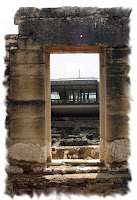
He leads me beside still waters.
Notes taken from the book (God's Psychiatry): Sheep are afraid of moving water. This is based on instinct; because of their thick woolly coats, they cannot swim. When sheep are thirsty, they will drink only from still water.
If there is no still water around, this presents a problem for the shepherd. So, while the sheep are resting (He makes me to lie down in green pastures), the shepherd gathers rocks to form a watering pool of still water.
The shepherd understands the fear of his sheep and provides a way of peace and safety.
Mother's Notes Written in the Book: Jehovah shalom (written not once, but twice in the margins). God of peace. God of still waters.
My Notes: After reading these words, I walked into my home and realized--for the first time--that as soon as one enters, the peaceful view of the lake is there. When the water is still, it looks like a pool of ink laying on the canvas of the world. It calls to me from nearly every room...but how often do I go out, sit, and drink of its beauty? Of its respite? Of its peace?
Not often enough.
But I have come to realize that long before I lost Mother, long before I began my struggle with "why?", God was at work gathering stones to form a place of peace where I can heal. The wound of losing Mother to heaven will never be fully healed until I join her there and stand before the Throne of Grace & Mercy with her, shouting "All glory and hallelujah" to the Prince of Peace and to his Father, Jehovah Shalom. But until then, God has prepared a place for me, where I can "drink" of His peace.
My notes to you: Where is your place of peace? Where can you go to find respite, to drink from God's goodness, from His Word, from the quiet he whispers into your soul? You may not have a dock jutting out over a lake. Your place of peace may be the shower, the commute train or the car. It may be your closet or the walk from the front door to the mailbox. Like Suzanne Wesley, mother of John & Charles, you may have to sit in a corner, throw your apron over your head, and demand a moment of peace (most mothers will relate to this). Even if only for a moment each day, find a place where you can be quiet. Take a short walk. A long walk. Whatever you need to do...but make a time of quiet. Of stillness.
My dear friend Robert Benson once told me, "Eva Marie, the only person who knows what God has whispered into your heart is you; but you won't hear him if you don't hush."
A famous line (misquoted) by Emerson goes like this: Let us be silent that we may hear the whisper of God.
Find the place God has prepared for you. It's easy to do. Just look for the rocks...











































